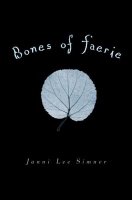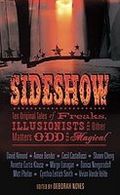 Post-apocalyptic realities have become familiar as slippers, the last several years, in the realms of both literature published for adults–The Road, Carhullan Army/Daughters of the North–and for young adults–How I Live Now, Life As We Knew It, The Knife of Never Letting Go. And there are plenty more. I don't know about you, but I love a good post-apocalypse. In her debut young adult novel, Bones of Faerie, Janni Simner inventively and memorably adds to the sub-genre, gracing it with a dark fairy tale of being lost in the woods. The terrifying, murderous woods.
Post-apocalyptic realities have become familiar as slippers, the last several years, in the realms of both literature published for adults–The Road, Carhullan Army/Daughters of the North–and for young adults–How I Live Now, Life As We Knew It, The Knife of Never Letting Go. And there are plenty more. I don't know about you, but I love a good post-apocalypse. In her debut young adult novel, Bones of Faerie, Janni Simner inventively and memorably adds to the sub-genre, gracing it with a dark fairy tale of being lost in the woods. The terrifying, murderous woods.
In the novel, a war between humans and Faerie has left the landscape devastated. Young Liza begins showing signs of magic, and must flee her town, or risk being killed for it. A fate she's not entirely convinced isn't what deserves, because magic is dangerous–but still, she runs, with the help of a local boy whose family died from magic run rampant. Over the course of the novel, Liza travels to Faerie, on the other side of the St. Louis Arch in search of her mother.
I dare you not to want to read this book after the thoroughly chilling opening. Here's a small excerpt:
I had a sister once.
She was a beautiful baby, eyes silver as moonlight off the river at night. From the hour of her birth she was long-limbed and graceful, faerie-pale hair clear as glass from Before, so pale you could almost see through to the soft skin beneath.
My father was a sensible man. He set her out on the hillside that very night, though my mother wept and even old Jayce argued against it. "If the faerie folk want her, let them take her," Father said. "If not the fault's theirs for not claiming one of their own." He left my sister, and he never looked back.
I did. I crept out before dawn to see whether the faeries had really come. They hadn't, but some wild creature had. One glance was all I could take. I turned and ran for home, telling no one where I'd been.
We were lucky that time, I knew. I'd heard tales of a woman who bore a child with a voice high and sweet as a bird's song—and with the sharp claws to match. No one questioned that baby's father when he set the child out to die, far from our town, far from where his wife lay dying, her insides torn and bleeding.
Magic was never meant for our world, Father said, and of course I'd agreed, though the War had ended and the faerie folk returned to their own places before I was born. If only they'd never stirred from those places—but it was no use thinking that way.
How refreshing–if post-apocalyptic stories can be refreshing–to encounter a full-on fantasy version of the apocalypse and its aftermath. It seems that much fantasy that invades this territory is centered around preventing said apocalypse. The dominance of science fiction in this realm might even seem to indicate that magic would serve to dilute the bleak landscape of decay that follows such wholesale destruction. But the magic of Simner's world only magnifies the sense of horror, of land and people still at war, unable to let go of battles that were lost.
Really, these are two territories–faerie and post-apocalypse–that are increasingly hard to do successfully because they seem to demand a recognition of their not-so-recent and recent history that can weigh down even the most skilled of writers. So greater kudos then to Simner for not giving us the easy version on either count. This is a daunting, destructive Faerie, but a mysterious one too–and although we find out what happened to it, we don't really find out much about the details of its before, only what we need for the story at hand. I admired the restraint. I also loved the creation of the human world, the attention to its texture, the attention to the new operating tendencies of nature, and to mixing the old knowledge and technology with the characters' new reality.
So maybe you liked The Road, but wished it had strong (or any, really) female characters and a bit of honest hope in it. Or maybe you hated it, for the lack of those (or for other reasons). Maybe you found the voice of the protagonist of Meg Rosoff's book off-putting and whiny*. Maybe you think you would rather DIE than read a novel that has anything to do with faeries. I suspect this novel will be worth your time, if any of those things are true–and even if you just like reading about life after the world ends.
See also: Short interview about the book on Tor.com
*I love that book, for the record. But I know a lot of people have issues with Daisy.
(I KNOW, HOLY CRAP, I DID AN ACTUAL BOOK POST.)

